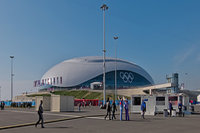By Elana Sulakshana
This blog originally appeared on the Brighter Green website.
Brighter Green is partnering with the Global Forest Coalition (GFC) and Biofuelwatch on a new project studying the intersection of deforestation, climate change, and industrial animal agriculture, in hopes of bringing attention to the connections between these issues at the global policy level. Brighter Green and the Global Forest Coalition recently produced a primer on this project that can be viewed here. We also recently translated this primer into Russian, opening it up to a wider audience. Russia is a significant importer of meat products from Latin America, where the livestock and feed industries are major players in the region’s deforestation.
Russia also has been in the hot seat by environmental standards, as much controversy swirls around the Sochi Olympics. In 2007, when Russia received the bid for the games, the administrators claimed that they would work as hard as possible to be “green” and produce “zero waste,” but the past few weeks have revealed a lack of follow-through on these ambitious (and vague) promises.
Though they spent nearly $51 billion, environmental standards were almost completely ignored; there is absolutely no mention of provisions for waste disposal in the budget. The Russian government relaxed environmental standards in order to build the Olympic village, which cuts through 8,000 acres of Sochi National Park and the Western Caucasus, a UNESCO World Heritage Site. The construction destroyed much plant and animal life, in what is considered the region of Russia with the most biodiversity.
Despite their zero-waste promise, tons of waste was produced, and it has been disposed of in the Akhshtyr dump, an illegal landfill located in a water protection zone. This trash has contaminated Sochi’s potable water and is expected to continue to do so for 10 years; journalists covering the Olympics have reported disgusting yellow-colored tap water.
Russian administrators have taken drastic steps to suppress all who have raised awareness of these issues. Russian environmental activist Yevgeny Vitishko co-authored a report that chronicled the ecological impact of preparing for the Olympics, detailing, among many problems, the devastation of salmon populations and the building of ski slopes inside Sochi National Park. He was recently sentenced to three years in prison–for spray painting a fence. Members of Environmental Watch of the North Caucasus, with whom Vitishko conducted research and wrote the paper, have reported being in a “state of war” with the Russian government, facing threats from the Federal Security Service.
Russia has continuously put up a front against these claims. A representative for Olympstroy, the state-owned company in charge of the majority of Olympic construction said, “Issues of environmental protection have become a priority in the design and construction of Olympic infrastructure.”
Russia must get on board with the protection of our earth and allow free environmental expression and activism, and the international community should place pressure on them to do so. We cannot face these same issues in Rio de Janeiro in 2016 or Pyeongchang in 2018; sustainability must be a key feature of future Olympics.
Photo courtesy of: Kenyee/Flickr

